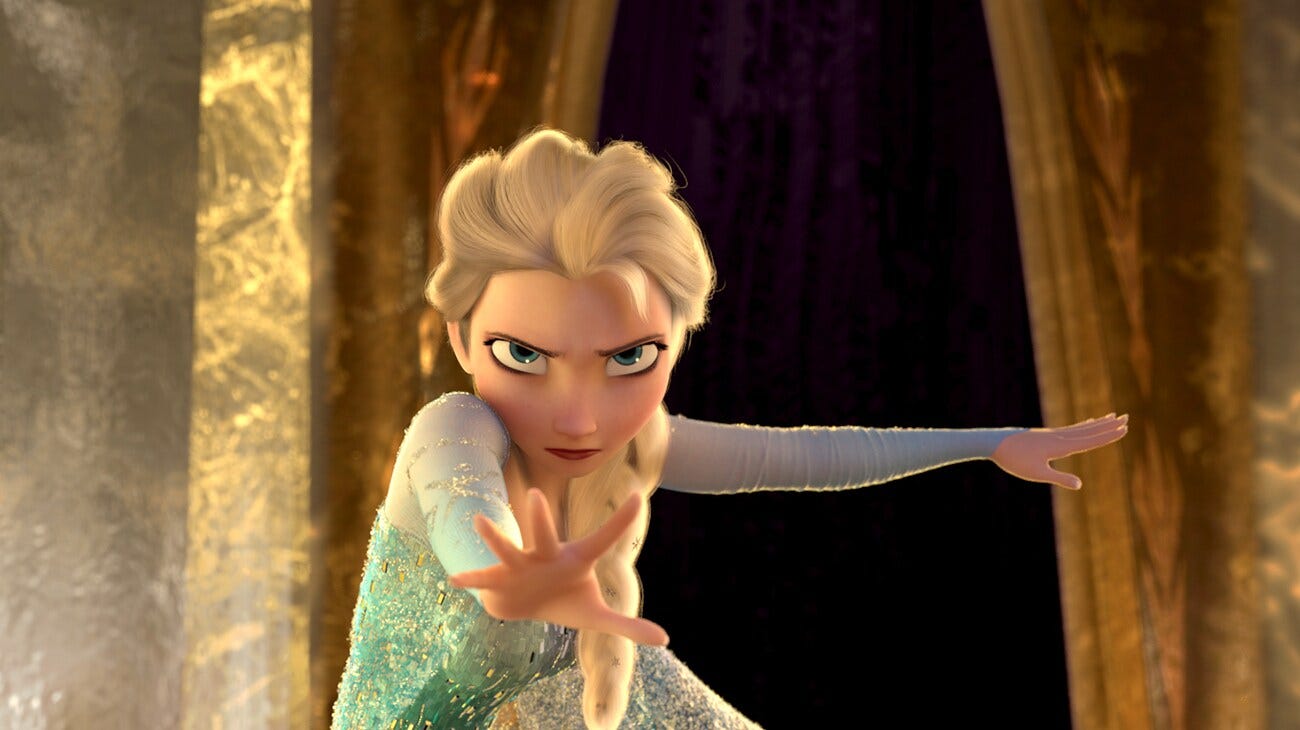10 years ago: ‘Frozen’ was Disney at its best
Disney’s having a tough time these days, after a year in which very little that it produced connected with audiences. But only a decade ago, it hit a creative home run with 'Frozen'
When I saw Frozen for the first time at a press screening at some point in November of 2013, there had been little hype, and I had little reason to think this animated film would end up being one of any great significance.
But then I saw the film and was absolutely blown away. Here was a Disney animated movie, arriving at a time when Pixar ruled the roost when it came to animation and Walt Disney Animation Studios did not. It had a lot of the elements familiar from classical Disney animation- it was a musical, with princesses, and magic, a literary pedigree, and cute singing sidekicks.
And speaking of the music, the songs were great. Like, up there with the very best of the “Waking Sleeping Beauty” era of the late ‘80s and early ‘90s. Written by the married duo of Robert Lopez and Kristen Anderson-Lopez, the songs are faithful to the conventions of both the Broadway and Disney traditions.
On the other hand, Frozen’s story was unique: It was not a traditional romantic love story — even if it looked like one at the start — but rather was built around the love of the two sisters.
Frozen arrived in theaters on November 27, 2013, ten years ago this week.
Based, somewhat loosely, on Hans Christian Andersen's "The Snow Queen,” Frozen was based on the orphaned princesses Anna and Elsa of Arendelle (voiced by Kristen Bell and Idina Menzel). Elsa has the power to create snow and ice with her hands, which led to a near-fatal accident that nearly killed her sister when they were young.
As adults, Elsa becomes queen, until the secret of her powers is revealed, and she goes into exile while coming to terms with her power while singing the ultimately Oscar-winning torch song “Let It Go.” Meanwhile, as the spell causes a permanent winter to fall on Arendell, Anna gets a pair of suitors, Prince Hans (Santino Fontana) and iceman Kristoff (Jonathan Groff), one of whom has a surprising heel turn.
There’s also the snowman Olaf (voiced by Josh Gad), whose existence comes with a built-in existential crisis, in that he’s likely to melt once the winter spell lifts.
To say this connected with audiences in a huge way is an understatement. For one thing, every little girl in America dressed as either Anna or Elsa for Halloween for a period of several years. Indeed, Frozen has earned over $1.3 billion at the worldwide box office, which made it the highest-grossing animated film of all time, although its sequel would overtake it for that distinction.
My kids, just 1 and 3 at the time, would watch the Frozen awards screener nearly daily for that entire winter, and for that reason, it’s a film I’ll always associate with my early fatherhood.
Then, at the Oscars, Frozen won both Best Animated Feature and Best Original Song (for “Let It Go”), cementing Robert Lopez’s EGOT.
Frozen was, inevitably, adapted for the Broadway stage, although its life on the Great White Way was short-lived, debuting in March 2018 but closing when the pandemic began; COVID also scuttled the show’s lone national tour.
Then there was Frozen II, which arrived in 2019 and was just plain weird. It had some successes – one of its songs, the Peter Cetera homage “Lost in the Woods,” is downright inspired — but despite box office success that exceeded that of the first film, the sequel never attained the same cultural ubiquity as the first film.
And in an age when Disney movies, like the recent Wish, are denounced as “woke” for no reason other than that the lead character is a woman or Black, the plot of Frozen II went way further- its entire premise was a parable about colonialism! But this set off not much of a backlash, mostly because the angry bros of the Internet don’t especially care about Frozen. Also, the “go woke/go broke” narrative failed to take hold, as Frozen II outgrossed the original.
But now, Disney isn’t in nearly the same place creatively. All of its major franchises, from the MCU to Star Wars to Disney Animation to Pixar to The Muppets, are in some rut or another, with all sorts of questions about how distribution is going to work going forward. The recent Wish was a very clear attempt to recapture the magic of Frozen, one that mostly failed.
To say they all went “woke,” and that’s the reason why, is reductive, lazy, and doesn’t require anyone actually to see the movies.
Then again, if you’ve read DisneyWar, or any of the other big books about Disney and Hollywood history, you’ll know that big rises, falls and rebirths are a huge part of Disney's history, and this cycle probably won’t be the last of them.
In other words, the current itineration of Disney may not seem capable of making something as great as Frozen, but there’s a good chance that sometime in the future they will.





